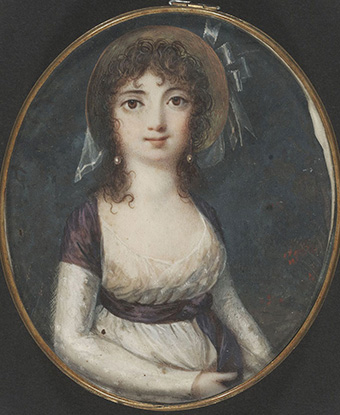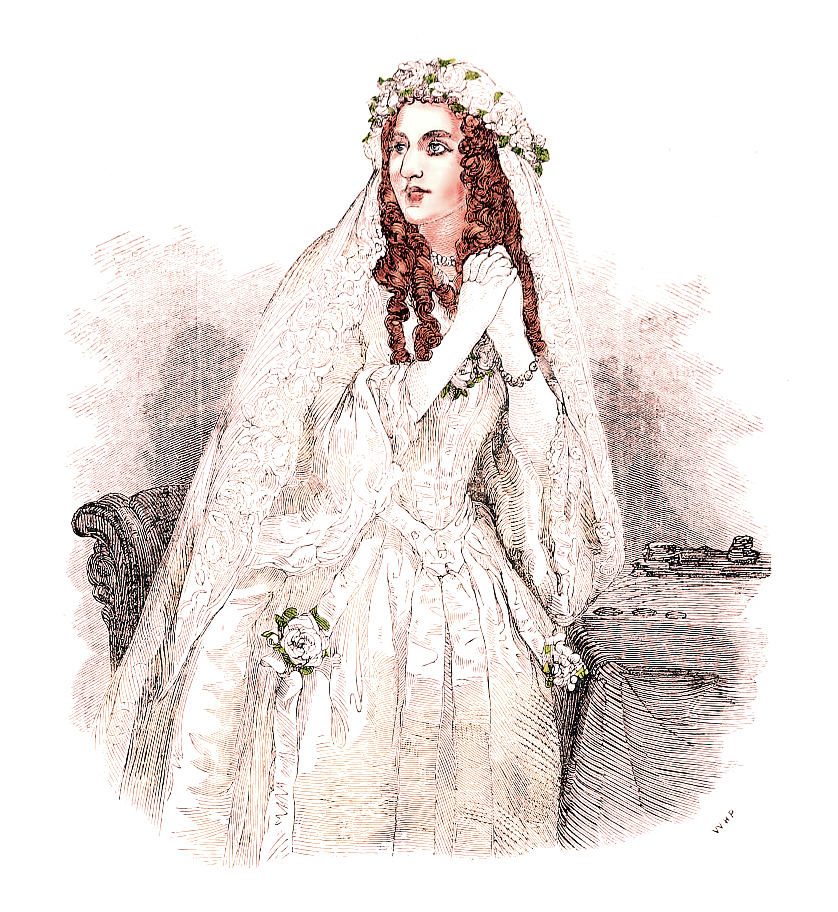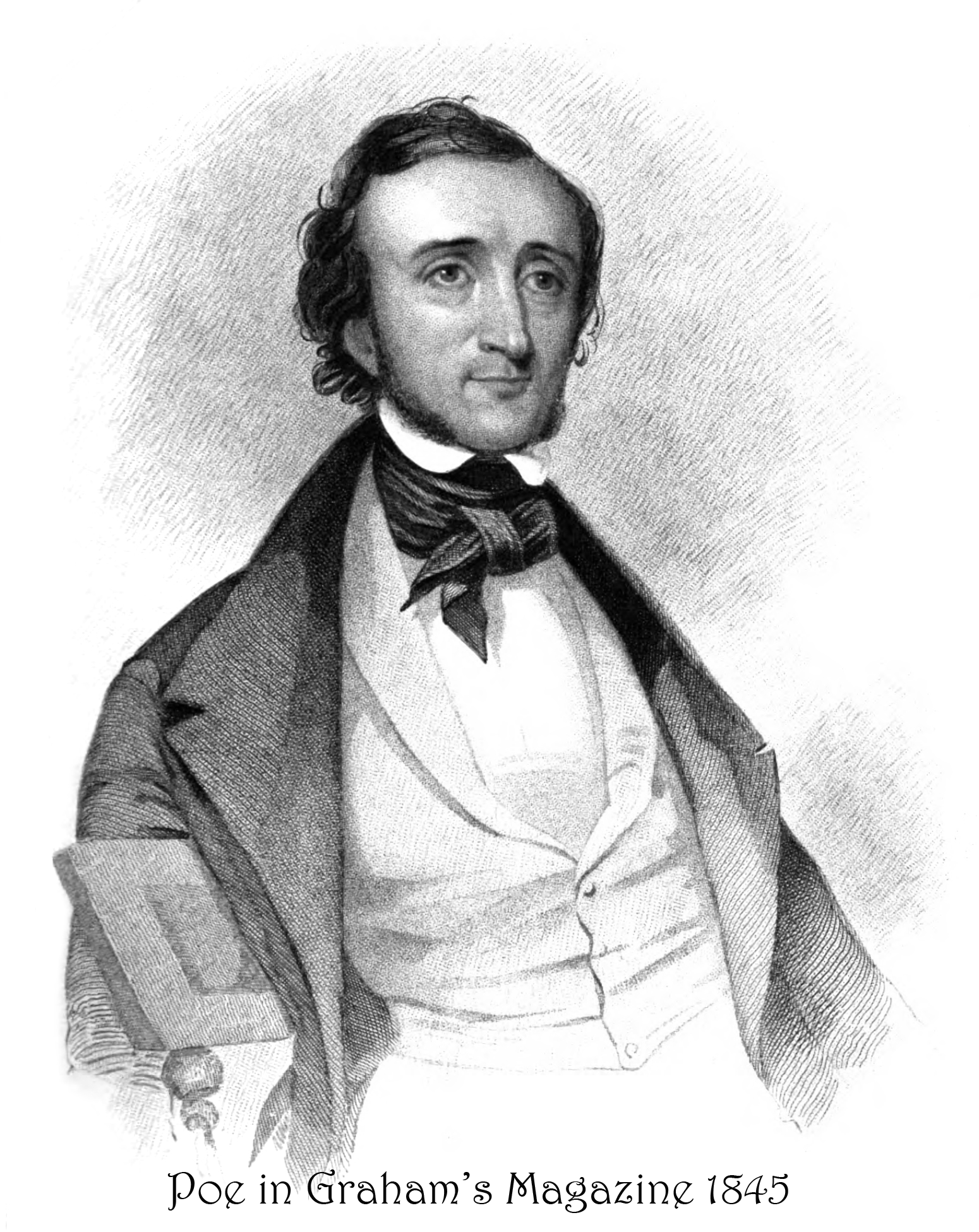| |
|
|
Mr. Poe's Favorite Actress
In
the summer of 1845, the
paths of Edgar Allan Poe and Anna Cora Mowatt crisscrossed for a few
brief,
memorable months. Both
were experiencing
success in careers that they ultimately would not be known for. Poe was
the
editor and owner of The Broadway Journal.
Anna Cora Mowatt had just made her debut as actress. Each had made a
literary
mark that would give them lasting fame earlier that same year. Poe
published “The
Raven” in late January. Mowatt’s play “Fashion” had debuted in March.
We
have no video of Mowatt.
There is only one extant photograph of her. It was taken after she had
retired
from the stage and had been through a long illness. However, we do have
Poe’s
vivid descriptions of her as she appeared on stage.
These
descriptions reveal
something about the writer as well. Poe’s relationship with his mother,
the
actress Elizabeth Arnold Hopkins Poe is
frequently cited as a source of pain
and misery in his life and works. However here
in his celebration of the
theatre, we see a different side of Poe as he warmly embraces the
memory of his
mother and proudly reclaims his theatrical heritage.
Poe
begins
the first of his series of reviews of performances on July 19, 1845 by
gently chastising Mowatt for her choice of venue. Although Mowatt had
debuted at the Park Theatre, the performances Poe would witness took
place at Niblo Garden, a Broadway theater near Prince Street with
considerably less prestige than the Park. As he puts it:
Mrs.
Mowatt owes it to herself to maintain a
certain dignity; and, although this certain dignity be preposterous, in
fact in
the fiction of the world's view it is all important. A lady so
well-connected,
and so well established in the public eye by her literary reputation,
could
have no difficulty in coming upon the stage in her own fashion, and
almost on
her own terms. The Park, as a place of her debut, was, of course,
unobjectionable, although in a negative sense. She lost no
caste by coming out there, but the fact cannot be disputed that she
would have
gained much by first appearing in London,and presenting
herself to her countrymen and countrywomen with the éclat of a
foreign reputation. We say this, with a bitter sense of our national
degradation, and subserviency to British opinion; -- we say it, moreover, with
a consciousness that Mrs. Mowatt should not have done this
thing however much it would have furthered her concerns.1
|

|
Here
Poe shows an awareness of the concern with maintaining social
respectability
while engaging in a career as a theatrical professional that obsessed
Mowatt in
her writing of Autobiography of an Actress.
As if directly
addressing the friends and relatives who shunned her after her debut on
the
stage, he launches into a full-throated defense of the theatre as an
institution:
|
Niblo's Garden, New York,
circa 1840
|
|
We have no sympathies
with the prejudices
which would entirely have dissuaded Mrs. Mowatt from the stage. There
is no
cant more contemptible than that which habitually decries the
theatrical
profession – a profession which, in itself, embraces all that can
elevate and
ennoble, and absolutely nothing to degrade. If some
– if many – or
if even nearly all of its members are dissolute, this is an evil
arising not
from the profession itself, but from the unhappy
circumstances which
surround it. With all these circumstances, Mrs. Mowatt has, at present,
no
concern. With talents, enthusiasm, and energy, she will both honor the
stage
and derive from it honor. In the mere name
of actress she
can surely find nothing to dread – nothing, or she would be unworthy of
the
profession – not the profession unworthy of her. The
theatre is
ennobled by its high facilities for the development of genius –
facilities no
afforded elsewhere in equal degree. By the spirit of genius, we say, it
is
ennobled – it is sanctified – beyond the sneer of the fool or the cant
of the
hypocrite.
The
actor of talent is poor at heart indeed, if
he does not look with contempt upon the mediocrity even of a king. The
writer
of this article himself is the son of an actress – has invariably made
it his
boast – and no earl was ever prouder of his earldom than he of his
descent from
a woman who, although well-born, hesitated no to consecrate to the
drama her
brief career of genius and of beauty.2
|
After
taking some time to discuss the play in which she appears, Poe begins
to paint the first of his vivid word-portraits of Mowatt:
Of
Mrs. Mowatt and of her acting, we have to speak only in terms
of enthusiastic admiration. We have never had the pleasure of
seeing her
before -- and we persude that there are many of our readers who have
never seen
her. Her figure is slight -- even fragile -- but eminently graceful.
Her face
is a remarkably fine one, and of that precise character best adapted to
the
stage. The forehead is, perhaps, the least prepossessing feature,
although it
is by no means an unintellectual one. Hair light auburn, in rich
profusion, and
always arranged with exquisite taste. The eyes are gray, brilliant and
expressive, without being full. The nose is well formed, with the Roman
curve,
and indicative of energy. This quality is also shown in the somewhat
excessive prominence
of the chin. The mouth is large, with
brilliant and even teeth and
flexible lips, capable of the most
instantaneous
and effective variations of expression. A more radiantly beautiful
smile it is
quite impossible to conceive. Mrs. Mowatt has also the personal
advantage of a
profusion of rich auburn hair.
Her manner
on the
stage is distinguished by an ease and self-possession which do credit
to a
veteran. Her step is very graceful and assured –
indeed all her
movements evince the practiced elocutionist. We watched her with the
closest
scrutiny and not for one instant did we observe in her an attitude of
the least
awkwardness, or even constraint, while many of her seemingly impulsive
gestures
spoke in loud terms of the woman of genius – of the poet deeply imbued
with the
truest sentiment of the beauty of motion.
Her voice
is rich and
voluminous, and though by no means powerful, so well managed as to seem
so. Her
utterance is singularly distinct – its sole blemish being an occasional
Anglicism of accent, adopted probably from her instructor. In
this
respect, no actress in America
is her equal, for she reads not theatrically, but with the emphasis of
nature.3
One
needs very little additional prompting to come up with a very complete
mental image of Mowatt emoting before the footlights.
Poe
would next speak of Mowatt on July 26. The play at Niblo's this time
was "The Bride of Lammermoor." Once more, the writer was
enchanted with the actress, but was in the throes of a pain familiar to
all book-lovers, a bad adaptation of a beloved novel -- or in
this case, a bad adaptation of a beloved opera:
If in all
the literature of fiction, there is a character for
which Mrs. Mowatt is peculiarly adapted, it is Lucy Ashton. If the
authoress
of Fashion knew her own strength,
she would confine herself,
nearly altogether, to depicting in letters as well as on stage, the
more gentle
sentiments and more profound passions. Her sympathy with the latter is
evidently more intense. In the utterance of the truly generous – of the
really
noble – of the unaffectedly passionate – we see her bosom heave – her
cheek
grow pale – her limbs tremble – her chiseled lip quiver – and nature’s
own tear
rush impetuously to the eye. Nor is it the freshness of the heart which
will
provide for her the greenest laurels. It is this enthusiasm – this well
of deep
feelings – which should be made to prove to her an exhaustless source
of fame!
As actress it is to her a mine of wealth – worth all the dawdling
instructions
in the world. Mrs. Mowatt as she now stands,
is quite
as able to give lessons in stage routine to
any actor or
actress in America
as is any actor or actress to give lessons to her.
Let her throw
all support to the winds -- trust proudly to her own grace of manner --
her own
sense of art -- her own rich and natural elocution -- and let her be
assured of
these qualities, as she now possesses them, are all sufficient, when
considered
simply as the means by which the great end of natural acting is to be
consummated -- as the mere instruments by which she may effectively and
unimpededly lay bare to the audience the movements of her own
passionate heart.
Feeling
this – being
well assured, from first seeing Mrs. Mowatt as Pauline, that her forte
lay in
the depicting of passion, we were anxious to see her in Juliet (a part
which
will yet render her immortal) and were delighted when we saw her
announced for
Lucy Ashton. But alas! It was Scott’s Lucy and not the Opera Lucy of
which we
dreamed. The play, as we saw it on Tuesday, is miserably ineffective –
and the
remembrance of that most passionate and romantic of novels, will
intrude itself
to render the defects of the dramatization more palpable. We even
fancied that
we could perceive the depressing influence of this remembrance in the
countenance
of Mrs. Mowatt. With a bosom full of
emotion she seemed to
suffer from the total insufficiency of the words of the dramatist to
give
utterance to her thought. But what was done was done to admiration. The
actress
lost no opportunity. The appeal to the mother was very noble acting.
The
signing of the contract and the wild shriek at the entrance of Edgar
would have
done honor to anyone. The apathetic and mute despair at the end of the
play,
and during the interview with Ravenswood in the mother’s presence – the
dumb
uncomprehending wretchedness – the half-conscious rendering up of the
broken
gold – the laboring anxiety for the relief of words – the final
maddening
confession, heartbreaking, and death in the lover’s arms – were the
teachings
not of Mr. Crisp, but of Nature herself – speaking in tones that could
not be
misunderstood. The audience grew pale, and were betrayed into silence
and tears
– and if anyone went away sneering that night, it is at least quite
certain
that he felt ashamed of the sneer.4
Poe
also found something to like about Mowatt's peformance in another play
on the bill that he thought very bad:
In Juliana
– because Juliana is a role altogether out of nature –
we did not expect Mrs. Mowat to do much – for not much is there for
anyone to
do. So far as gracefully dashing demeanor goes, she nevertheless
accomplished
something – and
Oh what a
deal of scorn looks beautiful
In contempt and anger of her lip!5
 The
pages of The Broadway
Journal recorded one last review of Mowatt at Niblo
Gardens dated August 2, 1845. The
pages of The Broadway
Journal recorded one last review of Mowatt at Niblo
Gardens dated August 2, 1845.
At Niblo’s
Mrs. Mowatt concluded her engagement on the 26th ult.
Her last appearance was as the Duchess in “Faint Heart Never Won Fair
Lady,”
and Katherine, in “Katherine and Petruchio.” The former of the pieces
is one of
the best things of its kind. It has all the neat epigrammatic spirit of
the
French Vaudeville – the ingenuity of its construction is remarkable –
its
incidents are vivid yet natural – its characters are well- sustained –
its
sentiments are occasionally noble – and, upon the whole, we know
nothing of the
same nature which combines so much of truthfulness with so much of
pure jeu
d’esprit. Not its least merit is its unity to effect.
Nothing,
we thing, could be better than Mrs.
Mowatt’s personation of the Duchess. The part, to be sure, affords
little
opportunity for histrionic display – but the astonishment at first
merged at
Ruy Gomez’ audacity – this astonishment at first merged in indignation
– then
gradually becoming admiration – and this suddenly converted into love –
were
points so admirably managed by the fair actress, as to leave nothing to
desire.
The beautiful lips of Mrs. Mowatt have, we fear, a singular facility in
the
expression of contempt.6
In
case
reading Poe's reviews of Anna Cora Mowatt might have persuaded a reader
that he was a tender-hearted critic, here's a sampling of the words he
had for her supporting cast:
In
Ruy Gomez Mr. Crisp was
intolerable. He entirely misconceives the character. The Spaniard, as
designed
by Planche, is a dashing ardent, chivalric cavalier, urged to the
extreme of
audacity by the madness of his passion, but preserving through all a
true
dignity, and the most uncompromising respect for the lady of his love.
Mr.
Crisp makes him an impudent trickster – at times even a vulgar
chuckling
mountebank – occasionally a simpering buffoon. The Marquis of Santa
Cruz was
well represented by Nickerson. Miss Taylor spoke and stepped more like
a
chambermaid than like a prince.7
Not
even William Shakespeare was spared a sideswipe:
Even
of the “Katherine and
Petruchio” as Shakespeare conceived it, we have no exalted opinion. The
whole
design of the play is not only unnatural but an errant impossibility.
The heart
of no woman could ever have been reached by brute violence. But, as
this drama
originally stood, it contained many redeeming traits of nature and
truth.
These, it was the opinion of Cibber, interfered with the spirit of the
thing,
and accordingly, he left them out – or if one or two were suffered to
remain,
our modern mangers unsparingly uprooted them.8
Poe,
however ended the review with a sweet farewell for his favorite actress:
In
taking leave of Mrs. Mowatt for the present, we have only
again to record our opinion that, if she be true to herself, she is
destined to
attain a very high theatrical rank.9
This
was, however, the last documented contact between the two. The Broadway
Journal folded in 1846. As he had recommended in his first
review,
Mowatt was playing to applauding crowds in England by 1847.
She
was touring Europe at the time of Poe's mysterious death in 1849.
NOTES
1. Edgar Allan Poe. "The Drama." Broadway Journal.
July 19, 1845, p. 184.
2. ibid.
3. ibid.
4. Edgar Allan Poe. "The Drama." Broadway Journal.
July 26, 1845, p. 189.
5. ibid.
6. Edgar Allan Poe. "The Drama." Broadway Journal.
August 2, 1845, p. 210.
7. ibid.
8. ibid.
9. ibid.

Poe's Evolving Views on "Fashion"



Poe and Mowatt Homepage
Poe's
Portrait
of Mowatt
Was Poe T. T. T

Back
to Index Page
|



